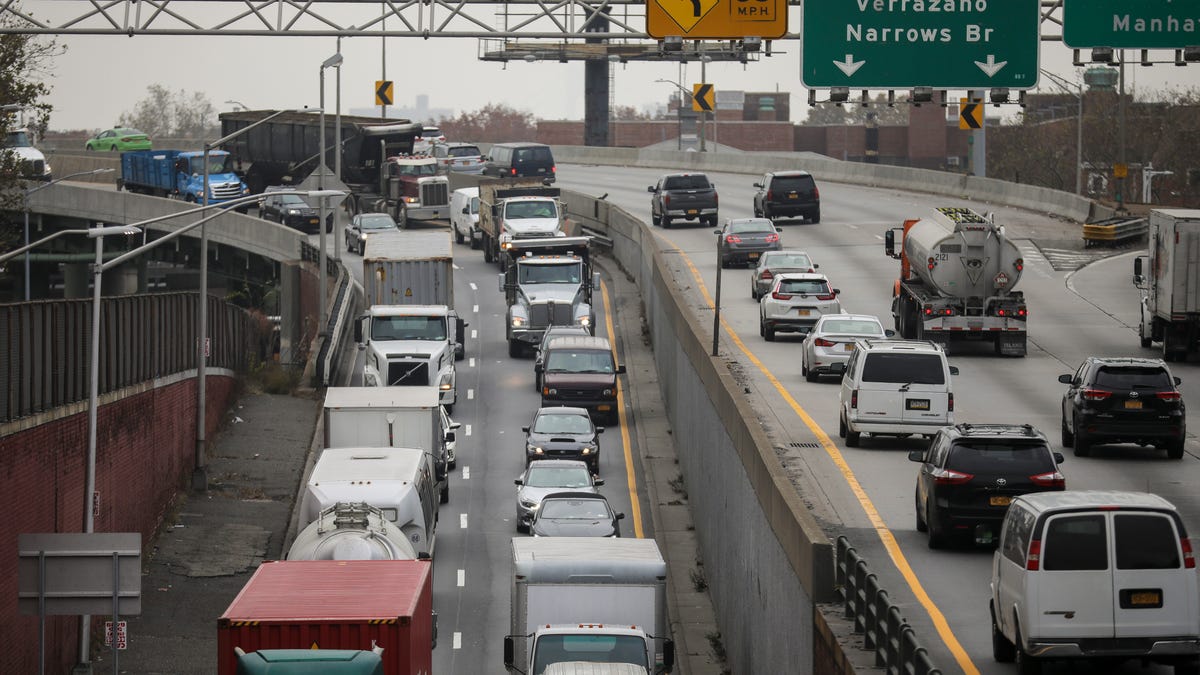Shocker: U.S. Highways Continue to Segregate and Destroy Communities

Heavy traffic moves along the Brooklyn-Queens Expressway, November 20, 2018 in the Brooklyn borough of New York City. Photo: Photo by Drew Angerer (Getty Images)
It’s a point of history often roundly mocked by those of the right wing persuasion. But anyone who’s read The Power Broker or listened to the stories of those displaced by infrastructure knows that racism is such a part of our country it shows up everywhere, even in our roads.
The New York Times published an exhaustive look into how urban freeways continue to divide Americans, ruin their health and safety and destroy communities, using a freeway-widening project in Houston to highlight the practice:
Since the mid-20th century, urban highway construction has worked as a powerful tool to segregate American cities and demolish communities of color. These imposing roadways served as a physical barrier to reinforce racist policies like redlining. As a result, walls of concrete and veils of smog and pollution grew to separate Black and brown communities from white.
Although government-led segregation is usually discussed as history, in the communities divided by these roads, considerable public health impacts persist. Increased investment in urban highways threatens to inflict further harm. In Houston, the expansion would demolish the Clayton Homes and displace many more residents from the historic Black and Latino neighborhoods of Near Northside and Independence Heights — all despite decades of evidence that widening highways does little to relieve congestion.
Local advocacy groups have protested the project, including by helping affected residents file complaints against the TxDOT, highlighting the expansion’s disproportionate impact on communities of color. Though this advocacy led the Biden administration to halt construction, invoking Title VI of the Civil Rights Act (which prohibits racial discrimination in any activity that receives federal funding), Texas relocated over 110 people anyway.
“Where adverse impacts can’t be avoided, our team is exploring an array of extraordinary mitigation strategies to help leave the impacted areas better than before and as whole as possible,” said a statement provided by a spokesman for the Texas Department of Transportation. “We know that many in the community are anxious to see this project advance.”
The piece goes on to tell the racist history of America’s freeway system, with photos that show the devastation freeways have caused in cities across America. Just look at the city of Detroit, which is carved up by six freeways: I-75, I-94, I-96, M-10, M-39 and the shortest freeway in America, I-375, at less than a mile long. I-375 destruction destroyed a vibrant and historic Black neighborhood when it was built in the late 1940s.
The Department of Transportation estimates at least a million Americans have been displaced from highway construction or expansion over the last half-century. So called “urban renewal” projects chased off hundreds of thousands more from their neighborhoods. Freeways also led to the emptying of industrial centers across the midwest, driving whites to suburbs which explicitly banned Black homeownership. As a result, Americans are still living in a country increasingly divided along racial lines. A study by NBC News found cities were more segregated in 2019 than in 1990.
G/O Media may get a commission
Magnetically Docking
Mode Electric Toothbrush
Luxury brushing
Mode is the first magnetically charging toothbrush, and rotates to dock in any outlet. The brushing experience is as luxurious as it looks—with soft, tapered bristles and a two-minute timer to be confident you reached all the crevices of your molars.
We’re still expanding these freeways in places like Houston, Austin and Portland where Black and Brown communities will carry the vast majority of the weight of lost neighbors and dirty air. That’s despite study after study showing that freeway expansion does nothing to curb traffic. Then there’s recent federal policy, which is designed to spur the growth of freeways when what we need is the opposite. From the Times:
But in the United States, federal legislation is moving in the opposite direction. Despite a well-intentioned $1 billion allocation in the Infrastructure Investment and Jobs Act to reconnect communities isolated by highway construction, that law provides far more for the highways themselves: over $273 billion — much of which is likely to be used for further expansion.
The recently signed Inflation Reduction Act threatens to feed our national appetite for highway widening. By emphasizing the funding of electric vehicles at the expense of more equitable and sustainable modes of transit, the federal government is choosing to repeat past mistakes and encouraging cities and states to do the same. Demolishing someone’s home for the convenience of a suburbanite driving an electric car is hardly better than if the car were powered by gasoline.
But at least there’s some headway being made to make cities cleaner and more equitable. A $6 billion freeway expansion in Los Angeles was canceled after the community fought back. Some cities are tearing out freeways rather than adding lanes. There are plans to transform the teeny tiny I-375 running through downtown Detroit into a lush boulevard with bike lanes and new green spaces.
The Times includes many more sickening stats and very illustrative graphics that show how cities are warped by highway constructions and expansions. I urge you to head on over and give it a read.



